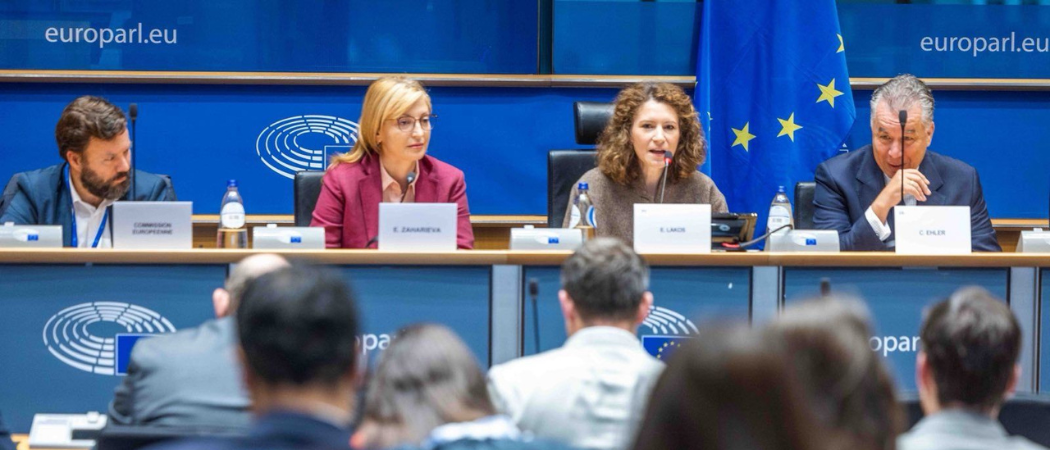A recent debate in the European Parliament opened old wounds, as legislative work on Horizon Europe’s successor gets started

Photo credits: European Union
Members of the European Parliament’s industry and research committee have defended the need for a Widening programme in Horizon Europe after 2027, but also noted that member states should take more responsibility for lagging national R&D expenditures and make better use of EU structural funds.
At an event organised by committee member Eszter Lakos in the European Parliament, MEPs agreed that the impact of the Widening programme is limited and cannot make up for low national budgets and the poor use of EU funds dedicated to reducing development differences among countries and regions.
The Widening programme has been designed to help countries that joined the EU after 2004 improve their performance in EU research funding competitions, but also to encourage them to join broader European innovation networks and projects. While some countries have improved their performance, many are still lagging behind, as national R&D budgets have stagnated and governments failed to reform the structure and incentives in national research systems.
As the EU is starting negotiations on the next iteration of Horizon Europe, due to start in January 2028, the Widening question is again on the table. However, MEPs agree that the programme will not solve the performance gap between older and newer member states.
Committee coordinator Christian Ehler, from the European People’s Party (EPP) said cohesion funding and the European semester, which is the Commission’s main tool for financial supervision in the member states, are “better tools” for incentivising countries to boost their R&D spending. “Widening cannot fix low national investment,” he said at the conference.
Ehler also called for a “mandatory quota” for research and innovation in EU structural funds.
“Synergies between the European Regional Development Fund and Horizon Europe should be better captured,” Lakos, also from the EPP group, said after the event. “It is time to design mechanisms that are genuinely accessible, user-friendly and capable of delivering tangible results on the ground.”
Also speaking at the event, EU research Commissioner Ekaterina Zaharieva said the Widening programme is a “political commitment” that research and innovation can spread equally in Europe.
Zaharieva warned that the Widening programme alone cannot plug the continent’s innovation gap. However, she said, “we cannot afford to leave parts of Europe behind” amid growing concerns that the overall competitiveness of the EU’s economy is stalling.
Ivars Ijabs, a Renew MEP from Lithuania, pointed out that national R&D expenditure is “rather low” in newer member states and more “structural funds should be dedicated to this goal.”
This view was echoed by said Giorgos Ioannides, deputy permanent representative of Cyprus to the EU. “Widening measures are not a panacea and need to be complemented by other efforts; we need national contributions and structural reforms,” Ioannides said.
Cyprus will take over the rotating presidency of the Council of EU in January 2026 and will help steer negotiations on Horizon Europe among all 27 member states.
Who will negotiate?
In updated versions of the Commission’s proposal for the next Horizon Europe, the Council has bracketed the article referring to the Widening programme, indicating that an “ad hoc working party” on the next multiannual budget will examine the issue during high-stakes negotiations among member states. This would allow representatives of national finance ministries to weigh in on the Widening debate, an idea that Ehler opposes.
The debate on Horizon Europe and its Widening schemes should be steered by research ministers, he said, to avoid a negotiation setting led by “people who are usually not very familiar with this issue.”
Two tiers
According to the Commission’s proposal, the Widening programme could have two-tiers of eligible countries, with a new category of “transition countries” created. This would include member states scoring above 75% in the Commission’s innovation scoreboard, an annual evaluation of research and innovation policies and investments across Europe.
According to the latest scoreboard, the Widening countries would be Bulgaria, Croatia, Czechia, Hungary, Latvia, Lithuania, Poland, Romania and Slovakia, while the transition countries would be Cyprus, Estonia, Greece, Malta, Portugal and Slovenia.
Ehler called for a “critical assessment” of which countries need the Widening programme. The system should be based on “historical participation data in Horizon Europe,” he said, as the scoreboard is “not the best metric.”
“We need a robust, transparent, and meaningful set of indicators that can capture real progress,” Lakos said.
However, the Commission has defended the idea. Jean-David Malo, acting director for the European Research Area at the Commission’s directorate-general for research and innovation, said the scoreboard has a “robust methodology” which offers “a balanced approach for the time being.”
MEPs to start work
The legislative file on the next iteration of Horizon Europe, due to kick off in January 2029, will soon officially land in research committee’s hands. “Work will start next week,” said Ehler. The first step will be for committee members to pick a rapporteur to lead the Parliament’s work on the file.
Ehler has already held the rapporteur position during the negotiations for the current Horizon Europe programme.





 A unique international forum for public research organisations and companies to connect their external engagement with strategic interests around their R&D system.
A unique international forum for public research organisations and companies to connect their external engagement with strategic interests around their R&D system.